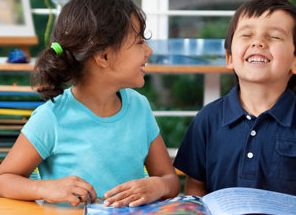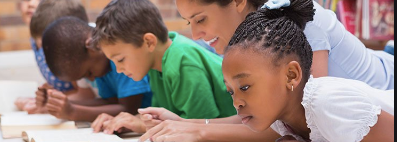Montessori In Practices: How to Support Literacy Skills in Children
Thursday, May 7, 2020
Edit
Montessori In Practices: How to Support Literacy Skills in Children
 |
| children literacy skills |
I'm gonna share with you a few tips of things you can do at home. to support the emerging pre-literacy skills in your children. literacy skills are the skills needed for reading and writing. they include things such as awareness of the sound awareness of the print correspondence between the print and the symbol and it also includes comprehension vocabulary and spelling.
We're going to look into it from two angles which I borrowed from Montessori one is the intellectual development of the child cognitively. so that they're able to read and write and the second is the motor mechanism the ability of the child to start writing letters now the most important thing to support the pre-literacy skills is to talk a lot to your children. I thought of a meeting this one because I thought it's a pure common sense and that everybody would do that but it turns out that lots of people do not get into conversations with their children.
Either thinking that they're too little to understand or the babies they don't know yet things they don't get into the habit of opening communication and discussion. so regardless how old is your child they maybe babies. please make sure you talk to them a lot and when you talk to them use expressive language lots of smiles, lots of visuals. because in that stage of their development that's what they read mostly.
The second thing is to expose them to as many books as possible again it's a common-sense for me but it's not a common practice according to some studies children need to be exposed not only to a great variety of books but they need to. it needs to be part of their routine whether it's in the evening before you put them to sleep or during the day or in the morning. they need to be daily exposed to books and but when I say books we mean all sorts and types of books. when they're very little starts with interactive books and books that they can touch and noisy books noise and the key here starts with big picture books and of course they have to be with the hard pages.
So that the child can explore on their own which is part of their process exploration on their own. but then move to all sorts of books that you may not think that they're for children different sorts of encyclopedias picture books with real characters in them. books about the development of civilization books about volcanoes science books. books about the life in the oceans all sorts of different books that sometimes are even for adults in their picture books because that's how the child learns a lot about being part of the world getting a cultural understanding of how other people live but also learns a lot about science even at that early stage make sure if you can to create a little book corner at your home.
It needs to be very inviting it needs to be a place where your child feels so comfortable that they want to spend time there. although you may read your child a book in the evening do not follow the whole script of the book stop when they ask you a question and engage in a conversation. because of this matter more than even just going through the story as it's written in the book. one thing to remember is also to leave your child to explore books by themselves. even if there are two years old and they don't know how to readjust maybe before you put them to sleep and if it's part of your routine. reading booth now you can go to the bathroom and tell them to start without me I will be back in a second because even if they're not able to read the symbols they're making their own stories.
Montessori Article: Montessori in practice, supporting independence of the children
In their head or their cleaving memory, if it's a book that they've already heard of next thing is be aware of the phonics what is funny chronic is the correspondence between the sound the phonemic and the symbol the graph EEMA of the letters and unfortunately in the English language, there are 26 letters only but an average 44 phonics phoneme --is which means that for a child for them to learn how to pronounce all these words. they need to start with something easier for them according to Montessori teaching them phonics is by far much easier because there is a one-to-one correspondence between the sound and what they see the symbol and here in the UK at school children learn currently.
I think it's from the past decades but they learn how to write a rate using phonics check how it is in your country if you fury in u.s. I think that there is a different approach and you want to align your child with the approach that is in your country but make sure that you don't expose them to songs such as ABC where the correspondence between the graph EEMA.
The phonemic is not their next one is increased the phonological awareness in your children and there are various ways to do that why is it so important for your child even be able to start reading or writing. they need to be able to distinguish between the different sounds and for us, it may be really easy but for children is very very hard. one way to do that is to play the game I spy with my little eye or I hear with my little ear piano or table when you start this game with your child if your child is young start with only two objects in front of them.
Let's say a cap and a fox and tell them I spy with my little eye something that starts with the letter K. then point to the cap that will start helping them distinguish between different sounds. if your child is a little bit older, if they have no problem distinguishing between sounds it would be easier for them to distinguish between the to distinguish the first sound. but usually the middle sound and final sound it's harder much harder for them.
 |
| support literacy skill in children |
What I do at home with my keys I spy with my little eye something that starts with the letter T and she goes around looks around and says table I spy with my little eye something that starts with the letter but he says book and that's how we played the game and now because he's better we can progress. and do the last Mika I spy with my little eye something that starts a boy whose name starts with Adrian and I spy with my little eye something that starts with the letter.
Over there me No okay I need to kill me I need to film baby next one is to expand their vocabulary I love Montessori because she always shared how she believed. the child is much more intelligent than we think they are and it always helps me when I'm about to introduce Irving to Mika and I'm thinking is he having the cognitive development to understand that but by knowing that they're more intelligent than we think they are.
I always go for the challenging thing to explain things to him so in terms of vocabulary we quite often tried to speak. baby language or try not to say the things the way they are using the right words. let's say when we introduced him to dinosaurs. let's say or to different sorts of dogs or whatever it is whereas she says no a child is the insensitive period for language and the child absorbs language like a little sponge.
Recommend Article: How to Discipline your child the Montessori way